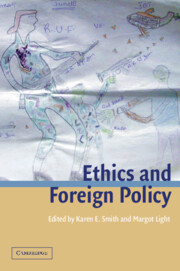Book contents
- Frontmatter
- Contents
- Notes on contributors
- 1 Introduction
- Part I Theories
- 2 Ethics, interests and foreign policy
- 3 The ethics of humanitarian intervention: protecting civilians to make democratic citizenship possible
- 4 A pragmatist perspective on ethical foreign policy
- Part II Instruments and policies
- Part III Case studies
- References
- Index
4 - A pragmatist perspective on ethical foreign policy
Published online by Cambridge University Press: 22 September 2009
- Frontmatter
- Contents
- Notes on contributors
- 1 Introduction
- Part I Theories
- 2 Ethics, interests and foreign policy
- 3 The ethics of humanitarian intervention: protecting civilians to make democratic citizenship possible
- 4 A pragmatist perspective on ethical foreign policy
- Part II Instruments and policies
- Part III Case studies
- References
- Index
Summary
In 1898 the United States engaged Spain in war with imperial gain its objective. The United States had already annexed the Hawaiian Islands; in defeating the Spanish, it forced that country to relinquish Cuba and Puerto Rico, and to negotiate the status of the Philippine islands. However, American troops, unaware of the armistice, took Manila Bay. Spain accepted the US acquisition of the Philippines in the Treaty of Paris in November 1898, but by 4 February 1899, the United States was engaged in war again, this time with the Filipinos who were fighting a war of independence.
Until this time, America had thought of itself as a country ‘opposed to militarism, conquest, standing armies and all the other bad habits associated with the monarchies of the old world’ (Tuchman, 1996: 137) that is, the aspects of the war system perpetuated by the European powers. America was to serve as the example of the democratic ideal abroad: a new world not bent on foreign dominion and conquest. According to this ideal, legitimate authority or power comes from the consent of the governed. Now the United States was fighting a war to suppress the will of Filipinos to rule themselves.
At roughly the same time, American philosophy was taking its own decisive turn. A tradition of thought which is understood to have had its beginnings in the writings of Ralph Waldo Emerson and its first expression in philosophy in the work of Charles Peirce was labelled as ‘pragmatism’ by William James in 1898 and advanced by him and John Dewey before and after the turn of the century (West, 1989).
- Type
- Chapter
- Information
- Ethics and Foreign Policy , pp. 55 - 72Publisher: Cambridge University PressPrint publication year: 2001
- 2
- Cited by



